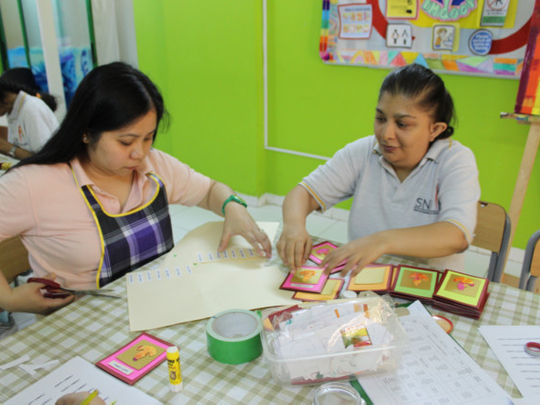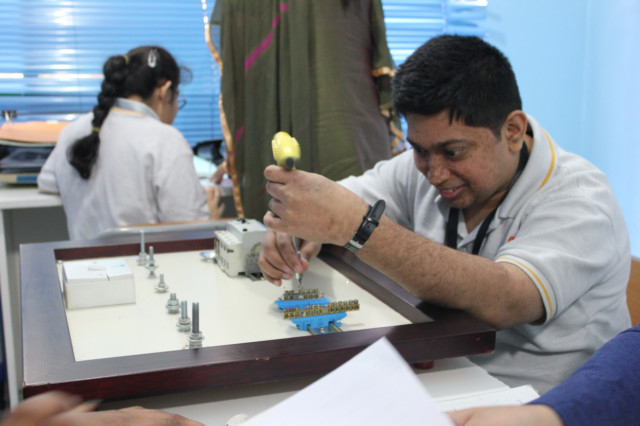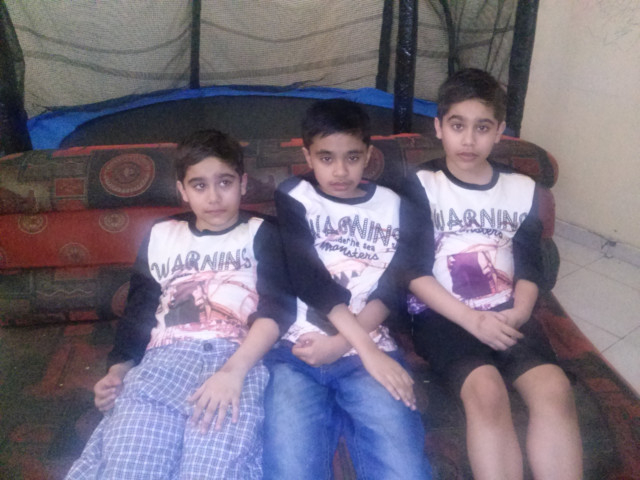
INTRO:
Much has been done to better the lives of the special needs community in the UAE. However, many young people still face inconveniences and challenges in their everyday routines that need highlighting. Gulf News met with parents of children with special needs to hear from them, as they share experiences and discuss issues faced, which reveal the need for improvement in certain areas of the system.
Dubai
Parents of children with special needs detail their problems and we try and find solutions.
CHALLENGE ONE: Parking permits
I recently read a report in Gulf News about special needs parking slots being used by regular motorists. This is especially prevalent in malls on the weekends.
The reason I write is because it is one of the issues we face as parents of children with special needs.
I belong to a support group called Special Needs Future Development Centre, based in Karama, where we train teenage children with disabilities. Some of the parents of these children, including me, are not given a special needs parking tag. The reason cited is that the car is not registered in our personal names, rather it belongs to the companies we work for. Why do our children have to suffer for this?
Can’t the authorities such as the Roads and Transport Authority (RTA) give us special needs parking cards, which can be displayed on the dashboard when we use these parking facilities when we are out with our children? This can be easily achieved by providing medical certificates from the hospital to the issuing authorities.
I have tried to ask the RTA about this so many times, but have been refused, because I have a car that belongs to my company. I have also submitted the relevant medical certificates to prove the originality of the case.
In the meantime, we just go around in circles trying to find a parking spot, while these empty special needs parking areas are constantly misused.
Why are we, as families dealing with special needs, excluded?
From Mr Nazim Motiwalla
Key account manager based in Dubai
Gulf News: We asked the RTA to clarify the rules for special needs parking permits.
Sultan Al Marzouqi, director of Driver’s License Department at RTA, said: “The requirement to get a special needs parking permit is a UAE ID, a valid visa copy for residents, and proof that the applicant is a UAE national or a holder of a valid visa issued from Dubai, or has a job or a house in Dubai.”
He clarified: “The applicant does not need to have a registered vehicle. The permit can be used in any vehicle, on condition of the presence of the disabled person.”
Al Marzouqi said new technology would make the process of applying for permits easier for parents of children with special needs. He said: “We call upon customers to use the service of renewing disabled parking permits on RTA’s mobile app. Soon, we will activate the issuing of parking permits through the app on smart phones as well, so that the applicant can get the permit without having to go to the customer service centres.”
CHALLENGE TWO: Healthcare
Nazim Motiwalla’s daughter, Amatuallah, is a 22-year-old who has been diagnosed with autism.
He moved his daughter’s medical files to Sharjah after he felt that her case wasn’t dealt with effectively in a hospital in Dubai. There was an occasion when she was at one hospital, and her file was at another.
Motiwalla said: “The file had to come from the hospital and it took about two hours... people forget that autistic children are highly temperamental.”
He suggests a system for identifying special needs files by giving them a distinct colour, so that doctors can filter through files and treat the patients more quickly and efficiently.
Motiwalla said: “They can prioritise them.”
He believes his daughter is now receiving appropriate treatment. He said: “They have set certain days only for children with special needs… that cuts down the time and there’s less stress for parents!”
Gulf News: As a humanitarian gesture, the Health Authority - Abu Dhabi (HAAD) has issued a health insurance card aimed at providing free medical treatment for selected categories. The ‘Aonak’ card is for people with special needs and orphans, who will be offered full medical treatment without having to incur consultation and other additional fees. Visit abudhabi.ae for more information.
CHALLENGE THREE: Lack of awareness
Melvin Pereira, an assistant manager in Dubai, recalled his daughter’s first operation at the age of one.
He said: “I carried her around all night, she had a band over her eyes.”
His daughter, Macey, is a 13-year-old with several physical disabilities, including visual impairment. Pereira has recently moved to the country with his family and is finding it difficult to get the relevant IDs and permits for his child.
He highlights this as a concern that many parents face initially: “I don’t know how to get a parking card… I don’t know where to go to get the card.”
He is not aware of the documents needed to apply for it either.
Pereira added: “I don’t even have a health card for her.”
As he is unaware of how to apply for one for his daughter, he is now forced to take her to private facilities that are more expensive.
Gulf News: If you are a first degree relative to an individual with special needs, you may go to an RTA center with documents that are specified on RTA’s website. After the documents are verified and the individual is identified as having the claimed disability, the card would be issued.
To receive a disability identification card, one can fill up the Disability Identification Card form found in the e-services section of the Ministry of Social Affairs’ website and upload the required documents.
CHALLENGE FOUR: Integration
Sultan Ali’s sons, Mohammad, Mustafa, and Ahmad, have all been diagnosed with autism.
The distributions manager in Dubai said: “The issue for us is that people have a lack of understanding about autism.”
Acknowledging that the UAE has worked to create greater awareness about autism, he claims that society’s response to the illness is limited to fear or pity.
Ali said: “The UAE government is very generous with humanitarian work, but I would appreciate more focus on the people living here and the challenges the special needs community faces.”
He believes that the media should reflect better diversity within society, by showing that those with disabilities are also included in society and must be treated with kindness.
Gulf News: A variety of services, programmes and initiatives are offered to people with special needs, by public and private rehabilitation and care centres in Abu Dhabi. To claim the services, a medical report from the Health Authority in Abu Dhabi needs to be issued, apart from the Disability Identification Card provided by the Ministry of Social Affairs.
The Dubai Autism Center is the largest and most comprehensive nonprofit organisation in the UAE, helping children with autism transition into the mainstream. They can be contacted on dubaiautismcenter.ae or 04-3986862.
Several UAE-based media projects are also aiming to end preconceived notions about autism. ImageNation Abu Dhabi is producing a documentary titled ‘As One’, which will look at children, parents and teachers involved in a unique musical theatrical program for those with autism. Rather than to elicit pity, it aims to create a sense of understanding and appreciation for children with autism.
CHALLENGE FIVE: Lack of sensitivity
Safia Bari is mother to 30-year-old Nusrat, who has been identified as a slow learner with mild cerebral palsy. She shares an incident with the group: “We were able to get a disabled parking card and went to Mirdiff City Center a week later. However, there was no space in the handicapped parking spots. My husband then went to see if the cars parked in these spots had the necessary stickers. Not a single car did.”
Bari said there was a dire lack of sensitivity towards those who might actually need the parking spaces.
She said: “My son-in-law was trying to find a space to park the previous day. The security guard told him to park in the handicapped parking. He said ‘no problem, just park’.”
Gulf News: As reported in Gulf News previously, a monitoring device created by Dubai Police will be placed at every handicapped parking spot in Dubai by the end of the year to apprehend violators. The sensor records cars parking in disabled slots while a 3G system checks whether the car is registered for a permit. If it isn’t, the car owner will receive a Dh1,000 fine as well as four black points.
CHALLENGE SIX: Education
Kishwar Barkat’s son, Rafay Arif Khan, is a 24-year-old with Downs Syndrome. Fortunately, Khan has been lucky enough to secure a steady job at a hotel.
Barkat said: “He started at Rashid Pediatric Therapy Center, then SNF and Al Noor.” She said these non-profit institutions were instrumental in helping him become an independent individual.
However, as a parent, she believes special needs school’s fees are very high compared to other schools.
This opinion is backed by numbers. A special needs centre’s training costs add up to almost twice the annual tuition fee for a student at a private school in Dubai.
Barkat said: “I have observed that sometimes, other parents are unable to meet the fee expenses, so are compelled to leave their children at home.”
Gulf News: Most training centres in the UAE heavily subsidise tuition fees, through support from fundraising and help from sponsors. Students’ annual fees at the Al Noor Centre are subsidized by 40 per cent, according to their website. Rashid Center for the Disabled currently teaches about 300 students, some of them are orphans or in need, whose families cannot pay the fees. All centres depend heavily on public goodwill for donations and sponsorships.
Additionally, the UAE has helped turn the spotlight on special needs education. The Khalifa Award for Education programme recognises the efforts of special needs educators, with financial rewards for deserving individuals, special need centres, and local community organisations. The Kafa’a programme is an annual professional development programme conducted by the Zayed Higher Organisation for Humanitarian Care and Special Needs (ZHO) to highlight best practices in special education, training, treatment, early intervention, inclusion and other issues related to the care and rehabilitation of people with special needs.
The writer is an intern with the Readers’ Desk of the newspaper










